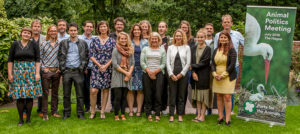Movimento mondiale in crescita – Riunione Animali Politics all’Aya
Dal 14 al 17 luglio si sono riuniti i partiti europei all’Aya per la Riunione annuale della Politica per gli Animali. I partiti fanno parte di un movimento mondiale in crescita di gruppi e partiti che danno priorita’ al pianeta intera e tutti i suoi inabitanti, invece delle interessi dell’uomo a breve termine. Gli ingredienti principali della riunione, che durava tre giorni, erano lo scambio di conoscenza e sperienze e rafforzare la collaborazione. La riunione fu organizzata dalla Fondazione Animal Politics, la fondazione che organizza le attivita’ internazionali del Partito per gli Animali.

Esistono oltre 15 partiti che si impegnano per le interessi degli animali, la natura e l’ambiente nel mondo. Questo numero e’ ancora in crescita, come il loro supporto e successo. Non solo nei Paesi Bassi, ma anche in Portogallo (PAN), Germania (Tierschutzpartei), Australie (Animal Justice Party) e Taiwan (Trees Party) esistono i rappresentanti di questi partiti.
In Portogallo, PAN e’ ormai rappresentato in tre comuni, e dall’anno scorso anche nel parlamento nazionale. PACMA, il partito spagnolo, ha raggiunto un risultato storico lo scorso giugno con oltre 284.000 voti per il congresso e 1.2 millioni di voti per il senato. Nonostante questo numero altissimo, il partito non ha raggiunto un seggio, per via del sistema elettorale spagnolo. Questo pero’ non vuol dire che il partito non possa influire. I partiti per gli animali sono la lepra nella maratona. Quest’anno non vi sara’ il festival Toro de la Vega in spagna. Grazie al PACMA, il festival che prevede centinaie di uomini cacciare un toro ed uccidere, non ha ricevuto la licenza quest’anno.
Nel Regno Unito il Animal welfare Party ha partecipato per la prima volta in Scozia e l’Irlanda del Nord. A Londra il partito raggiunse 1% dei voti. L’Animal justice Party finlandese e’ riuscito a raccogliere abbastanza firme per registrare ufficialmente il partito. In Australia si e’ evidenziato durante le elezioni questo mese che anche il supporto per l’Animal justice Party in Australia e’ in crescita. In Victoria questo pou’ ancora risultare in un seggio nel Senato.
From 14 to 17 July 2016, European parties for animals gather in The Hague for the annual Animal Politics Meeting. They are part of a growing worldwide movement of groups and parties that do not put the short-term interests of man in the pivotal position, but the entire planet and áll her inhabitants instead. During the meeting in The Hague transferring and exchanging knowledge and strengthening cooperation are key ingredients. The conference is organised by the Animal Politics Foundation, the foundation responsible for the Party for the Animals’ international activities.

At the moment, there are over 15 parties for animals worldwide that are dedicated to the interests of animals, nature and environment in politics. In The Netherlands (Partij voor de Dieren), Portugal (PAN), Germany (Partei Mensch Umwelt Tierschutz), Australia (Animal Justice Party) and Taiwan (Trees Party), these parties have representatives. The number of parties for animals is still growing, and so is their support.
In Portugal, the party for People, Animals and Nature (PAN) is represented in three councils, and since last year also in national parliament. PACMA, the Spanish party for animals, wrote history in the national elections of last June with over 284,000 votes for the Congress and 1,200,000 votes for the Senate. Despite the large number of votes, the party is not awarded any seats in the parliament – unprecedented in Spanish parliamentary history. This is because of how the electoral system and the electoral district work in Spain. However, not having a seat does not mean not having influence. Parties for animals are like pacers in the marathon. In Spain, thanks to PACMA there will be no Tora de la Vega festival this year, an event where hundreds of men chase after a bull and then kill it with lances.
In the UK, the Animal Welfare Party was standing for the first time in Scotland and Northern Ireland, and in London they got almost 1% of the votes. The Finnish Animal Justice Party succeeded in getting enough signatures to register the party officially. In Australia, the elections earlier this month show that the support for the Australian Animal Justice Party is growing, which in Victoria may result in a seat in the Senate.
At the Animal Politics Meeting subjects such as preparing for the next elections, building a strong party structure and campaigning experiences are shared by the seven countries attending.